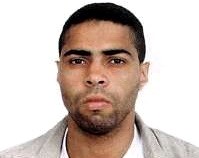Early life
Arklöv was born in Liberia; his biological mother was black and his father was white. At the age of three he was adopted by a couple from a small village in northern Sweden, and in his teens he ironically developed a strong interest in Nazism and World War II. Later on he joined a neo-Nazi organization and became an active supporter.
Bosnia
Arklöv participated voluntarily in the war in Yugoslavia in the 1990s, as a mercenary on the Croatian side when he was only 19 years old. He has been accused of war crimes, including torturing Bosnian prisoners in camps in Gabela and Grabovina.
After the war he was sentenced to thirteen years in prison by a Bosnian court. The court later changed the sentence to eight years, taking Arklöv's youth into consideration. He spent one year in a Bosnian prison, but returned to Sweden after an exchange of prisoners organized by the Swedish Red Cross. In Sweden he was taken into custody, but after a while he was acquitted for lack of evidence.
Police murders
While in custody Arklöv received several letters from another Neo-Nazi, Tony Olsson, who was starting a new Nazi organisation and, impressed by Arklöv's war experience, wanted him to join. Arklöv wrote back, and the two became friends. After being released, Arklöv and Olsson met with the other members of the newly started NRA (Nationalistiska Republikanska Armén, the Nationalistic Republican Army), among them Andreas Axelsson and Mats Nilsson.
This arrangement resulted in a robbery tour in the Swedish province Östergötland in 1999, which ended on May 28 in the small town of Kisa where Arklöv, Olsson and Axelsson robbed a bank. They got away with over two million Swedish krona, but during their escape, they encountered two policemen setting up road blocks just outside the small community of Malexander. There was a shootout between the robbers and the policemen, and finally the policemen were executed with their own weapons.
Arklöv and Olsson fled, but Axelsson had been hit by a bullet and was taken to the hospital by a car flagged down by Arklöv. On May 31, 1999 Arklöv was shot by the police in Tyresö outside Stockholm and again arrested and put into custody.
Trial
During the trial, Arklöv claimed to be completely innocent. He said he had been in Stockholm the entire time and did not take part in any of the robberies or the murders. This time, however, the evidence against him was strong. The police had found his fingerprints on a gun, and his DNA on a mask and in the car. After that he confessed to the robbery in Kisa, but still denied to have killed the policemen. All three of the men appear to have been involved, and it could never be proved who was the killer.
The court then found them all guilty of murder, since it was clear that they had all been shooting at the two policemen, and they were sentenced to life imprisonment. The sentence was appealed to the Court of Appeal, and Arklöv kept denying he had anything to do with the murders. The Court of Appeal gave the same sentence; life imprisonment for all three.
Crimes against humanity charges
In March 2004, the Dagens Nyheter journalist Maciej Zaremba published an article strongly criticizing the closure of the case, and he also managed to find several witnesses to the war crimes. Later that year the prosecutor decided to re-open the investigation, and in June 2006 it was clear that Arklöv would be prosecuted. His trial opened on November 10th 2006 and the judges made their ruling on December 18th, 2006.
The court ruled that Arklöv was guilty of wrongful imprisonment, torture and assault of 11 Bosnian Muslim prisoners of war and civilians, ethnic cleansing, looting, and arbitrary detention of people; crimes protected by international law. He was ordered to pay between 70,000-425,000 kronor (€7,700-€47,000; US$10,100- US$62,000) to 11 victims.
In prison
In 2001 Arklöv suddenly decided to confess: He was indeed the one who executed the two Swedish policemen. Olsson and Axelsson moved a petition for a new trial to the Supreme Court, but that court regarded the life sentence as written in such a way that Arklöv's confession would not change anything. The petition was rejected. At the same time Arklöv said he had abandoned his Nazi beliefs and had contacted the Exit group for help.
Currently, Arklöv is serving his life sentence at the Kumla High Security Prison. He is an artist, and had seven paintings put out on an exhibition for prison art at Långholmen in Stockholm.
Swede convicted of war crimes in Bosnia
December 18, 2006
The Associated Press

